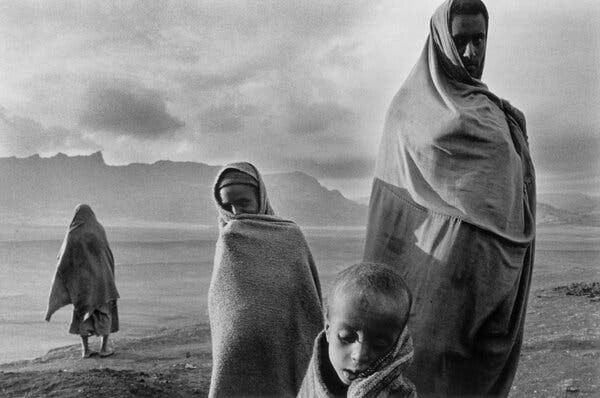
From the small town in the Brazilian countryside where he was born, Sebastião Salgado, the renowned photojournalist who died on Friday at 81, traveled the world many times over, documenting the plight of workers and chasing the grandeur, diversity and, ultimately, fragility of nature.
In photographs — most often in richly contrasting black and white — Mr. Salgado brought viewers to famine-stricken refugee camps in Ethiopia, to a hive of toiling gold miners in Brazil, to firefighters battling burning oil fields in Kuwait, and to chinstrap penguins sliding down ice slopes in the Sandwich Islands.
Mr. Salgado had a gift for bringing together, often in a single frame, the immediacy of individual human suffering and the enormity of the dire realities that he documented. His photographs, frequently displayed in museums and galleries, often show a figure standing against the horizon. Cloud-filled skies are reflected on the surface of a river in the Amazon rainforest. Rays of heavenly light pour down onto mountain landscapes in the tundra, signaling to the viewer that this place is divine.
This is the world Mr. Salgado left us: beautiful, fragile, sacred. Here is a selection of his work.

Refugees in the Korem camp in Ethiopia, 1984.
The Rwandan refugee camp in Benako, Tanzania, in 1994. Right, children inside the Kimumba camp in Goma, Zaire, now the Democratic Republic of Congo.
Workers in a gold mine in the northern Brazilian state of Pará in 1986. Some of Mr. Salgado’s most famous images were of workers climbing from the bottom of the mine to the dumping ground at the top while carrying 30 kilos of soil on slick ladders.
Churchgate Station in Mumbai, India, in 1995. Mr. Salgado published “Migrations” in 2000, a series documenting the mass migration of people forced to leave their homes by war or economic hardship.
Chemical sprays protect this firefighter against the flames from a burning oil well in Kuwait in April 1991. Mr. Saldado’s photo essay “The Kuwaiti Inferno” was published in The New York Times Magazine in June 1991.
Members of the Safety Boss Company of Canada worked to plug damaged oil wells, an effort to repair damage done by Iraqi troops.
Mr. Salgado had been traveling for his epic ecological work “Genesis,” a series about the effects of human activities on the environment.




Mr. Salgado spent years traveling across the Amazon, capturing arresting images of vast rivers and rainforests while documenting the impact of development on natural landscapes and Indigenous communities.
Members of the Yanomami tribe from the community of Maturacá in 2014, looking out to the mountain vegetation on the flanks of Pico da Neblina, or Mist Peak. The Yanomami believe their most important spirits inhabit these mountains, which were long occupied by hundreds of gold diggers, until 1992, when the Brazilian Army expelled all of them. The tribe keeps watch over the region for potential intruders. A shaman, chanting and dancing, prepared the expedition up to the peak.